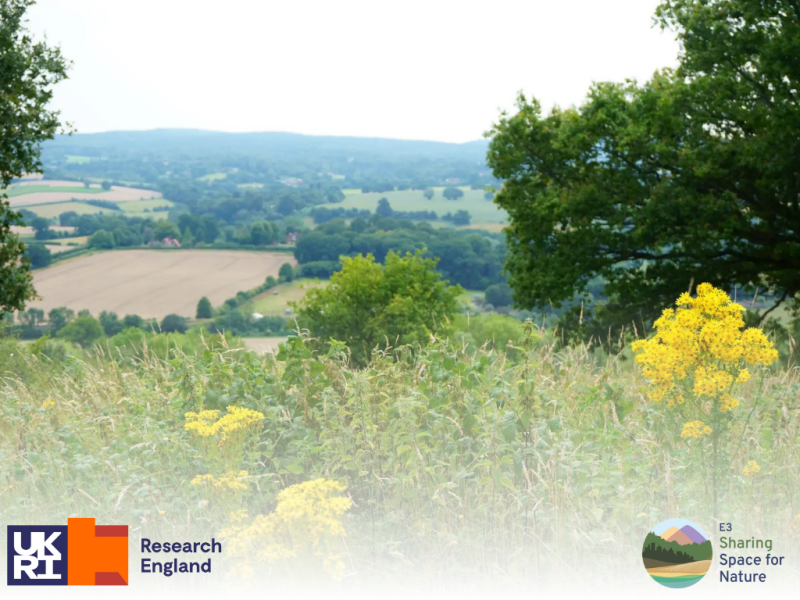
Please note applications are now closed.
Scholarship value
The PhD scholarship includes an annual stipend (equivalent to the Research Councils UK National Minimum Doctoral Stipend; the 2025/26 rate is £20,780, which is not taxed income). Tuition fees will be covered at the home student rate only. The PhD scholarship comes with a £10,000 research and training fund.
Deadline
The deadline to apply for this E3 Sharing Space for Nature Doctoral Scholar funding is Sunday 11th May 2025.
Criteria
Eligible candidates must:
- Hold a 1 or 2.1 Bachelor's degree or, if applicable, a taught Master's degree at merit or distinction or MSc by Research. The Bachelor’s degree should be in conservation, ecology or environmental sciences. Please be aware that securing a PhD scholarship tends to be a competitive process, with most applicants holding a Master’s degree.
- Be a highly motivated student interested in producing high-impact, policy-relevant research. The candidate should have strong analytical skills and, ideally, GIS expertise.
- Provide a CV. On the CV, please list the degree modules you have studied and provide the grade you were awarded for each one. Please also provide the overall grade you were awarded for your degree(s).
- Provide a covering letter, which outlines why you are interested in the PhD, no more than two A4 pages long. Any statement exceeding this limit will not be accepted.
- Provide academic references in support of your application; these will be requested if you are successful through the shortlisting process.
- Shortlisted candidates will be interviewed by members of the supervisory team. The interview questions will be given to shortlisted candidates in advance.
- Be able to start the PhD programme in Sept 2025.
Scholarship details
Title: Understanding and optimising local nature recovery networks in England
School of PhD registration: Durrell Institute of Conservation and Ecology, within the School of Natural Sciences
PhD degree award: PhD in Biodiversity Management
Application deadline: May 11th 2025
DICE primary supervisor name: Professor Bob Smith
Primary supervisor email: r.j.smith@kent.ac.uk
DICE secondary supervisor name: Professor Zoe Davies
Secondary supervisor email: z.g.davies@kent.ac.uk
Project Summary: The UK Government has set ambitious biodiversity and nature recovery targets to meet national and international conservation commitments. A key element of achieving these targets in England is the implementation of Local Nature Recovery Strategies (LNRS). Each county is currently developing their own LNRS based on nationally developed guidelines, working with a wide range of local stakeholders to produce a list of biodiversity priorities and map the most suitable locations for conservation, restoration and habitat creation. These outputs will likely play a major role in county-level spatial planning. However, their success also depends on the extent to which these LNRSs combine to form regional networks, and how they contribute to, or clash with, national targets for biodiversity, tree-planting, food security and infrastructure.
Systematic conservation planning is the most widely used approach for developing conservation area and nature recovery networks. It is ideally suited for assessing the effectiveness of LNRSs in meeting regional and national targets and understanding the trade-offs between different land-uses. This project will use systematic conservation planning to focus on the nine counties in South East England to explore questions such as:
- How and why do the LNRS methodologies, biodiversity priorities and spatial outputs differ between counties?
- To what extent does each county’s LNRS combine to produce a viable, ecologically representative and connected network for the South East?
- How should national biodiversity, climate change, food security and infrastructure targets be devolved to the regional and county-level?
- How feasible is it to meet all these targets in South East England and what are the best options for making trade-offs?
Training: The student will develop spatial databases using ArcGIS/QGIS, work with Natural England, Nature South East and other partners to collect biodiversity and socio-economic data, and run systematic conservation planning analyses using Marxan with Zones, CLUZ and prioritizr. They will also learn academic skills such as academic writing, analysing data in R, giving conference presentations and time management.
Person specification: A highly motivated student interested in producing high-impact, policy-relevant research. The candidate should have a degree in conservation, ecology or environmental sciences, strong analytical skills and, ideally, GIS expertise.
How to apply
Please apply by sending your covering letter and CV to ssfn@kent.ac.uk by Sunday 11th May 2025 at 23:55 BST. For informal enquiries about the project, please contact the primary supervisor directly via email, as listed above.